Table of contents
Editor's note:
Fifteen years ago, you could count the number of payment infrastructures for businesses on the continent on one hand. Moving money across countries was a herculean task for businesses.
Now, the ecosystem has grown, and digital payment systems in Africa have grown by 37% in transaction volume over the past five years. The value of Africa's mobile money transactions increased by 39% from $495 billion in 2020 to reach $1.4 trillion in 2023 and there are now a lot of payment infrastructures to choose from across the continent.
In this blog post, we’ll introduce you to the top seven B2B payment processing companies on the continent. This isn't a ranking. You won't find us declaring winners and losers because the "best" payment provider depends entirely on what you're trying to build and where. Instead, this is an educational deep-dive into the different providers, their history, the problem they’re solving and their products and services.
1. Kora (Formerly Korapay)
Kora launched in 2017 with a mission to solve a fundamental problem: over 800 million Africans lacked access to financial services, trapped in cash-based economies that prevented credit scoring and perpetuated poverty cycles. Dickson Nsofor, our founder and CEO, experienced these inefficiencies firsthand, where remittances took 48 hours and cost 9% in fees. And cross-border payments were so slow it was literally faster to drive cash between neighbouring countries.
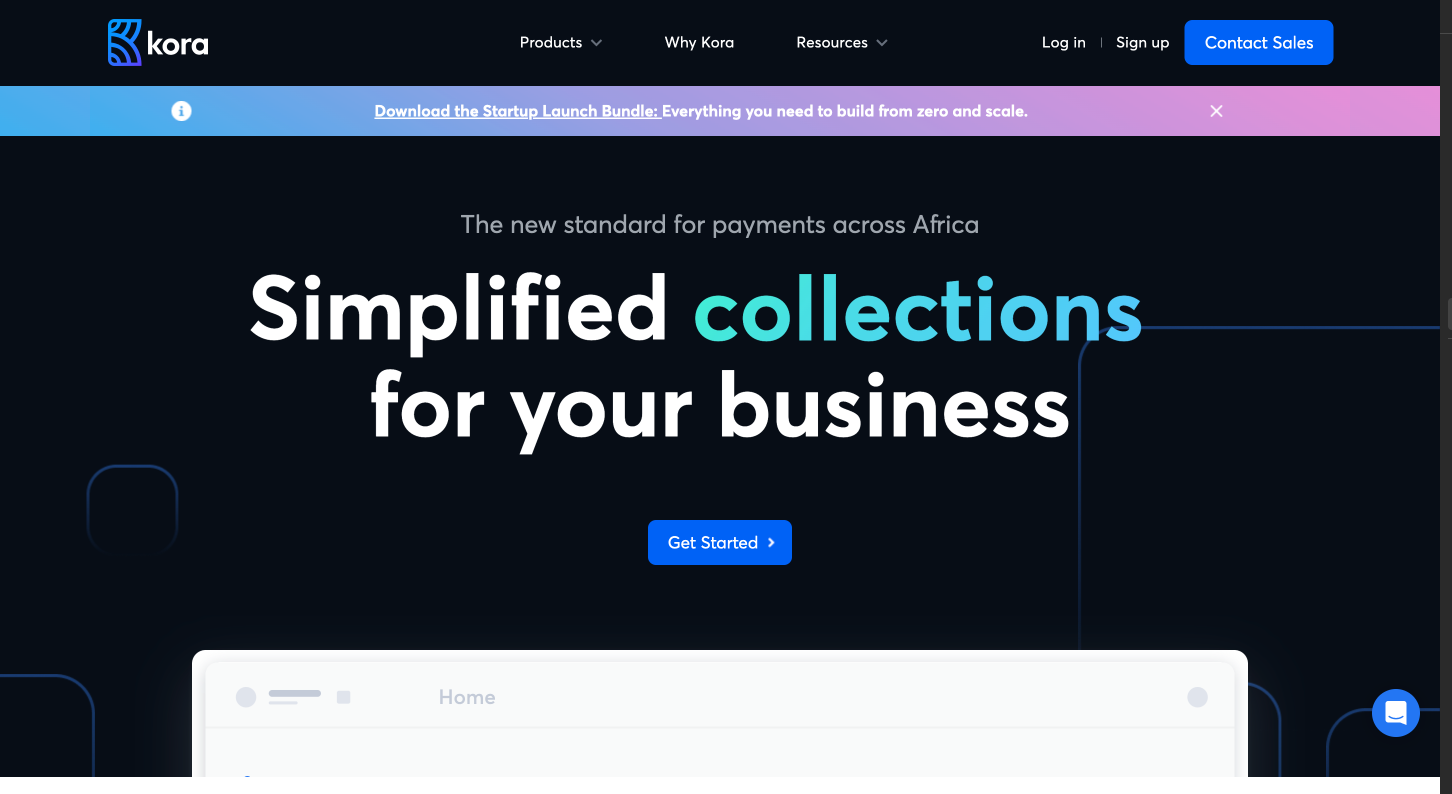
Kora's initial solution was a remittance solution that targeted the $45 billion annual remittance market flowing into Africa. The product enabled digital money transfers from the United States to West Africa through web and mobile platforms, with recipients accessing funds instantly through the Kora mobile app.
However, in 2019, market realities drove a strategic pivot from the original remittance focus to B2B payments infrastructure. Our vision expanded beyond individual remittances to connecting all 54 African countries. Today, we provide an API-driven infrastructure with payins, payouts, virtual card issuing, identity verification, and settlement services. We solve the core problem businesses face: needing separate integrations with dozens of providers to operate across different African markets.
With Kora, businesses can now accept and send payments through multiple channels - cards, mobile money, bank transfers, virtual bank accounts, and EFTs across Nigeria, Kenya, Ghana, Cameroon, Ivory Coast, and South Africa. In addition, businesses can also access core infrastructure for Identity and Card Issuing all from one place.
What makes Kora different is the ease with which businesses can access these services from one dashboard.
Products
- Multi-channel acceptance: Accept payments via cards, mobile money, bank transfers, virtual bank accounts, and EFTs.
- Checkout: A secure, embeddable checkout solution for websites and apps that supports one-time and recurring payments.
- Payment Links: A no-code option for businesses to accept payments without a website.
- Virtual Bank Accounts: Create dedicated static or dynamic virtual accounts for customers to make easy payments and for businesses to simplify reconciliation.
- Single & Bulk Payouts: Send real-time payments to local bank accounts and mobile money wallets, either individually or in large batches.
- Payout API: A simple, secure API for programmatic disbursements, requiring only the recipient's bank information.
Settlement and currency management
- Multi-currency settlement: Accept payments in various African currencies (e.g., Ghana Cedis) and receive settlement in a preferred local currency (e.g., Nigerian Naira).
- Instant settlement: Offers instant settlement capabilities within the jurisdictions it serves, providing businesses with faster access to their funds compared to traditional T+1 cycles.
Customer cards and Reserved virtual cards
- Customer cards: Access to Issuing APIs that let you create, manage, and distribute virtual debit cards (Mastercard & Verve) for your customers.
- Reserved virtual cards for expense management: Issue corporate virtual cards for your business or employees with customizable spending limits and real-time transaction monitoring to control business expenses.
- Branded experience: Customized virtual cards with your company's branding for a smooth user experience.
Identity verification:
- Multi-country KYC: Verify customer identities across multiple African countries like Nigeria, Ghana, South Africa and Kenya.
- Comprehensive checks: Conduct checks against various government-issued IDs, South African ID Number (SAID), National ID cards, and voter IDs.
- AML & compliance: Avoid fines and stay compliant with AML and compliance regulations across multiple African countries.
- Fraud prevention: Helps businesses onboard legitimate customers securely and reduce the risk of identity fraud.
Technical architecture and integration
- Unified API: Everything you need under one giant dashboard. With few API integrations, you can access Kora's entire product suite across multiple countries (Nigeria, Kenya, Ghana, Cameroon, Ivory Coast, South Africa).
- Compliance & Security: Kora is PCI DSS compliant and holds ISO 27001 & ISO 22301 certifications. We also protect customers with multi-factor authentication, data encryption, real-time AML monitoring and other fraud prevention processes.
2. Interswitch
To understand Interswitch, you have to teleport back to Nigeria in 2002. It was a country of 130 million people with few ATMs, and Point-of-Sale (POS) machines were practically non-existent. The financial system ran on cash.
For businesses, moving money and settling a transaction could take days, and check fraud was rampant. In this environment, the idea of connecting the nation's banks with electronic switching technology sounded impossible. And that was exactly what Interswitch did.
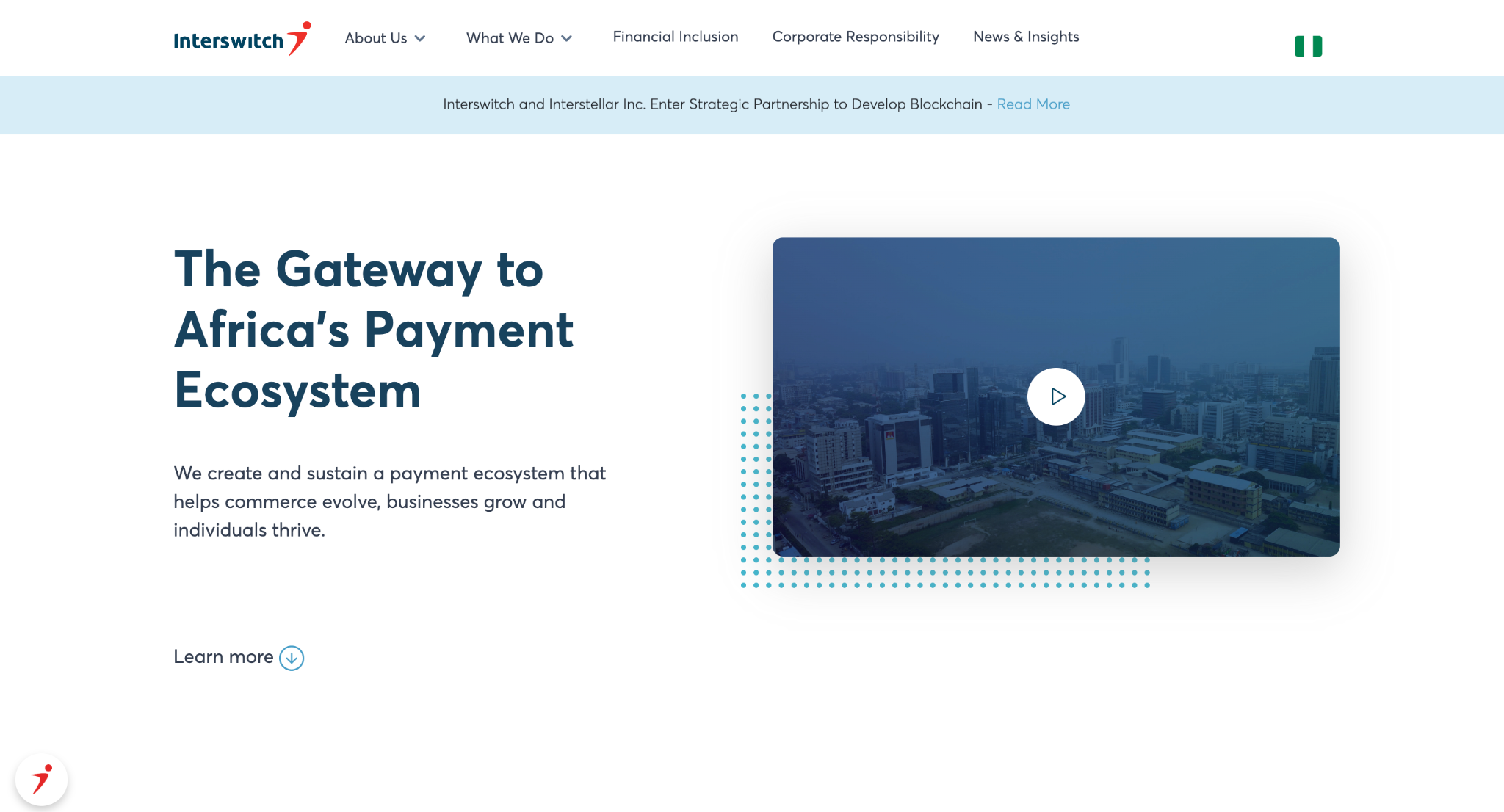
Interswitch’s founding was as unique as its mission. It wasn't a garage startup. It was a consortium, a strategic alliance co-owned by 7 Nigerian banks, Techinvest Limited, and Accenture. They became the foundational layer that many newer payment companies now build upon. Without exaggeration, they are original pioneers of Nigerian fintech.
Their Verve card scheme puts payment cards in the hands of over 70 million Africans, and their Quickteller platform now connects 8,000+ billers across an extensive network spanning both digital and physical touchpoints. Today, Interswitch processes a huge volume of transactions in Nigeria. In 2019, they became a unicorn after Visa’s $200 million investment for a 20% stake.
What makes Interswitch unique isn't just its scale; it's its position as the bridge between Nigeria and Africa’s cash-heavy offline economy and its rapidly digitising future. While newer competitors focus on sleek APIs and developer experience, Interswitch's superpower remains something far less glamorous but infinitely more valuable: the deep institutional relationships and battle-tested infrastructure that took decades to build and would be nearly impossible to replicate today.
3. Flutterwave
While Interswitch was building Nigeria's foundational payment rails, Iyinoluwa Aboyeji and Gbenga Agboola (GB) discovered firsthand how difficult cross-border payments could be. So, they birthed Flutterwave in 2016. From day one, the vision wasn't just to fix Nigerian payments; it was to create the infrastructure that would let African businesses transact seamlessly with the rest of the world.
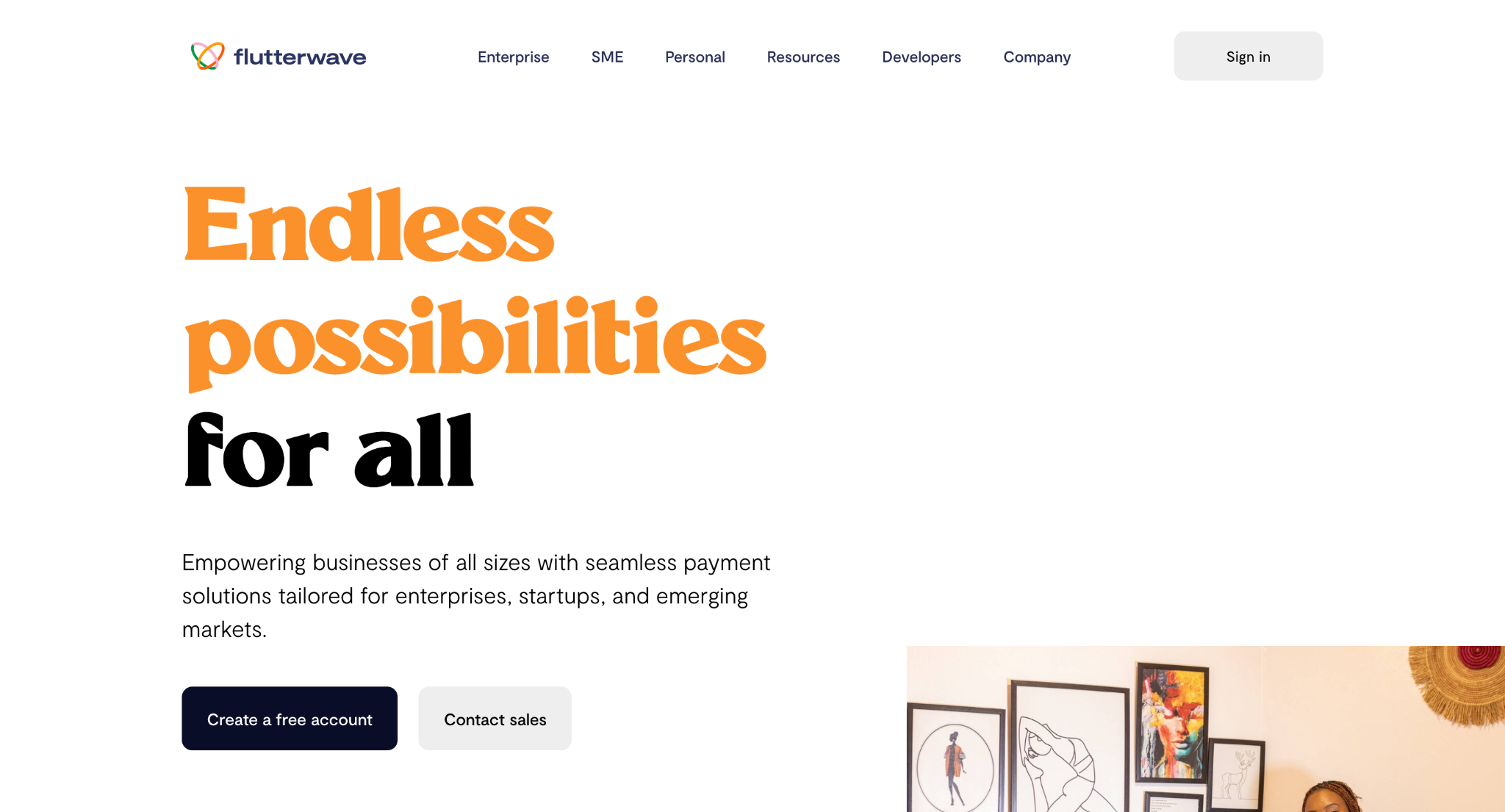
Flutterwave saw an opportunity to build something fundamentally different from anything on the continent: a developer-first platform that could handle complex, multi-country payment flows with the simplicity of a single API call.
What makes Flutterwave unique is its relentless focus on being the payment infrastructure for Africa's global ambitions. While other providers focused on domestic transactions, Flutterwave built comprehensive multi-currency support, and partnerships that span continents. Their client roster reads like a who's-who of global tech: Uber, Facebook, Booking.com, and MTN—companies that demand enterprise-grade reliability and global reach.
But Flutterwave's real innovation isn't just in payments processing; it's in its comprehensive product suite, which treats payments as just one piece of a larger financial infrastructure puzzle. Its remittance app, Send, and other products show a company thinking about moving African businesses into the global economy with the sophistication and reliability they need to compete on the world stage.
4. Paystack (A Stripe company)
In 2016, accepting online payments in Nigeria was unnecessarily difficult.
While other payment infrastructure players dominated the market with enterprise-grade infrastructure, smaller businesses had to pay huge setup fees, battle with weeks-long integration processes, and documentation that required dedicated technical teams.
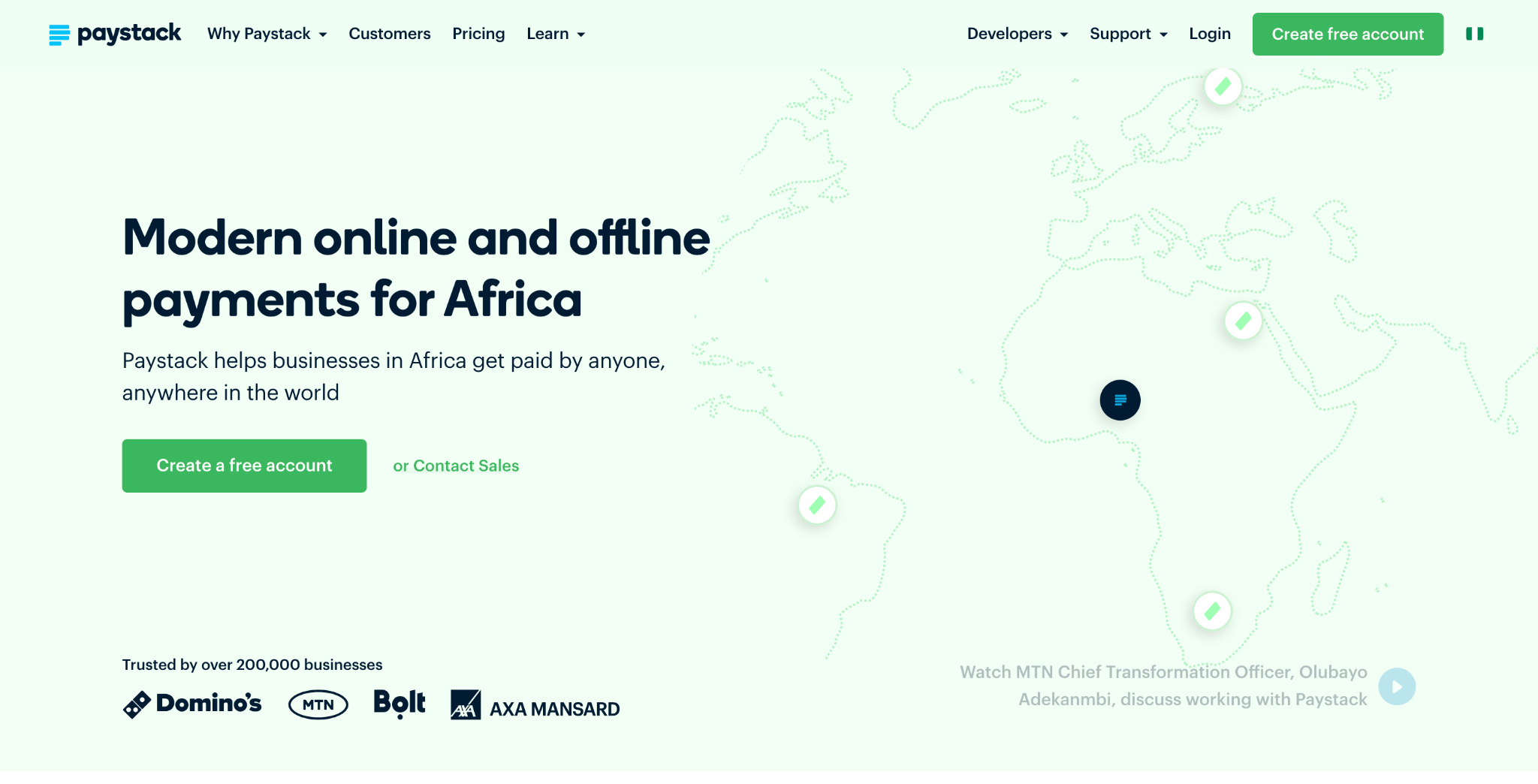
These barriers were a stumbling block for startups and digital businesses driving Nigeria’s digital economy. Paystack's solution was radically different: they made payments integration so simple that any developer could implement it in hours, not weeks. The company reduced integration time and shortened the payment flows. Their API documentation became the gold standard in African fintech, clean, comprehensive, and developer-friendly.
While competitors built just payment processors, Paystack focused on elevating user experience. They understood that in a market where transaction failure rates could kill businesses, reliability was priceless. This focus on user experience extended beyond developers to end customers. Paystack launched novel and exciting products in the market that changed the B2B payment landscape, such as direct debit and pay-with-bank.
Their developers' first strategy worked, and helped them grow and scale from processing $250 in their first month, to hundreds of millions in monthly volume. Their client base grew from small startups to major enterprises, proving that world-class developer experience could serve businesses of all sizes.
Apart from being the first Nigerian company to be funded by Y Combinator, their acquisition by Stripe for $200+ million in 2020 sent ripples throughout the payment industry and helped raise global businesses' confidence to expand to Africa.
5. DPO Group (a Network International company)
While Interswitch, Flutterwave and Paystack were building in West Africa, another payment giant was growing in Southern Africa.
DPO Group emerged in 2006 to solve a fundamental problem: African businesses couldn't easily accept payments from international customers. In Kenya's early digital payments landscape, a comprehensive payment infrastructure was virtually nonexistent.
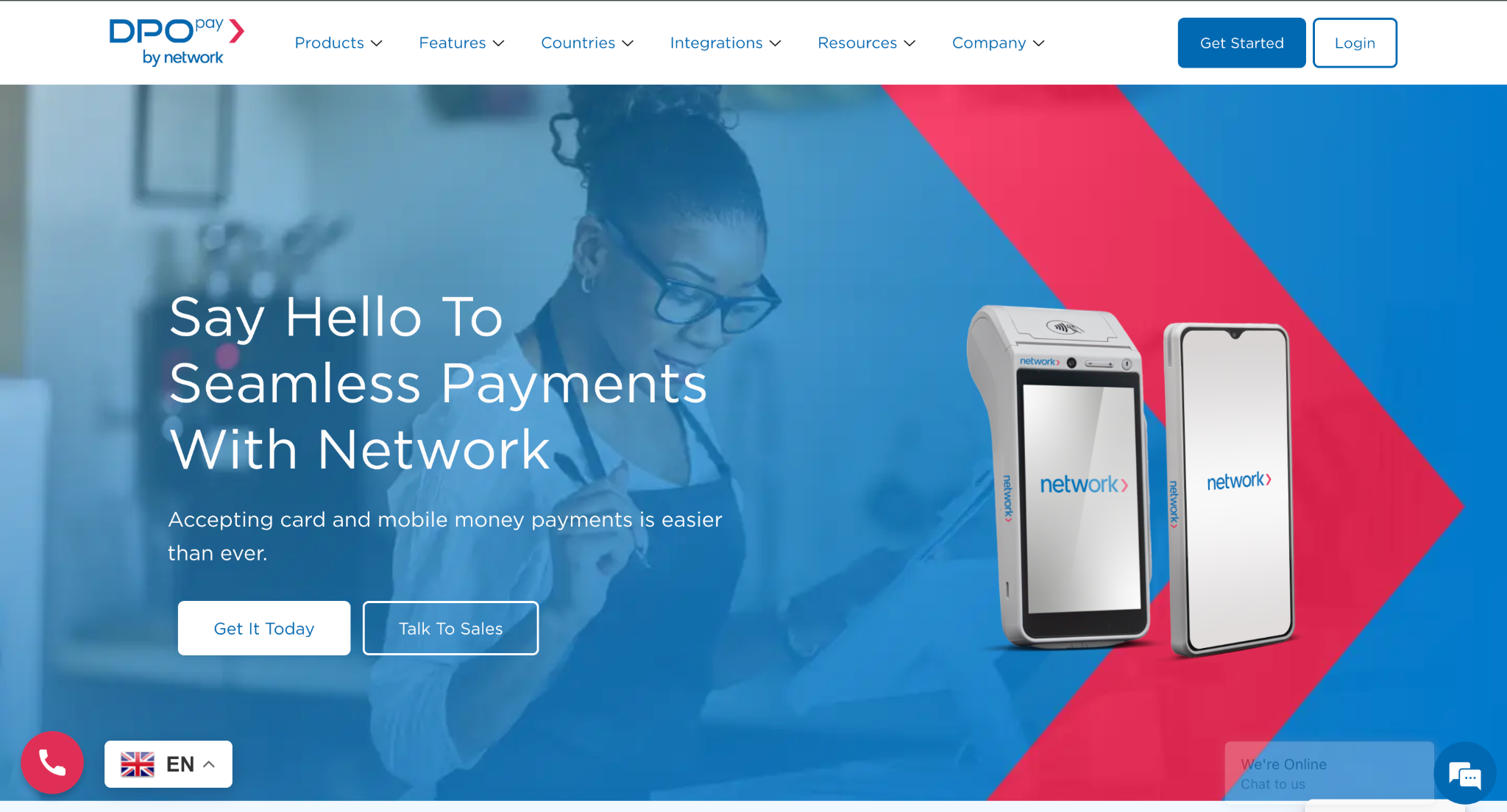
The company initially provided consulting services to help airlines and travel companies process online payments, bridging the gap between international payment expectations and African financial infrastructure limitations. DPO operated as a lean, profitable consultancy, growing from around 60 to over 400 employees throughout its investment period.
The transformation began around 2016 when private equity backing from Apis Partners enabled an aggressive acquisition strategy. DPO systematically acquired five companies between 2016-2019: PayGate for enterprise payment processing, PayThru for mobile money integration, Virtual Card Services for card issuing, SiD Secure EFT for bank transfers, and PayFast for e-commerce payments.
This consolidation created something unique in African payments: A platform handling the entire payment value chain through a unified API. The integrated platform made DPO PayGate "the biggest PSP in Southern Africa". By acquisition, DPO operated across 21 African countries, serving over 60,000 merchants, including airlines, hotels, and e-commerce platforms.
6. Cellulant
Cellulant launched in 2003 as a mobile content company, initially selling ringtones and music through telecom partnerships. The business model was straightforward: charge users $0.60-$1.00 per download, with telecom operators taking most of the revenue.
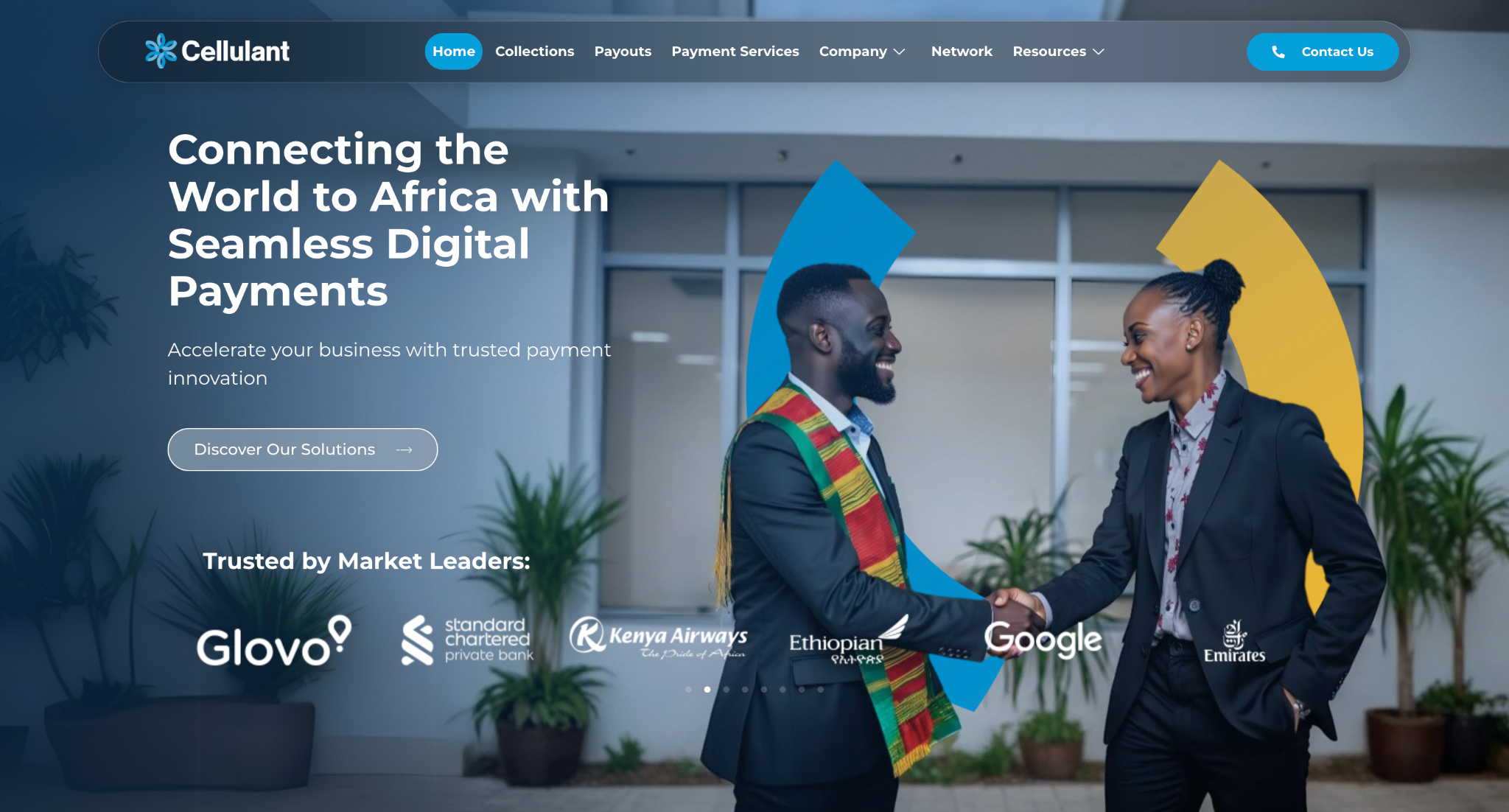
When smartphones began threatening this model, Cellulant recognised an emerging opportunity in Africa's fragmented payments landscape. While working with telecom billing systems, the company discovered banks struggled to serve retail customers digitally. This insight drove their transformation into payments infrastructure, becoming one of the earliest payment companies in Kenya and East Africa.
By 2011, Cellulant had evolved into a "converged payments ecosystem platform", solving the core problem that merchants faced: needing separate integrations with dozens of payment providers across different African countries. Their solution was radical simplicity through a single API.
The company's product strategy culminated in Tingg, its unified payments platform that handles mobile money, bank transfers, cards, and cross-border payments through one integration.
Companies like Emirates, GIG Logistics, Bolt, Dominos and Ethiopian Airlines use Tingg as their single collection gateway across Africa. The platform connects 120 financial service providers, 40 mobile network operators, and over 600 businesses across 34 countries, serving 220 million customers.
By 2021, this infrastructure was processing 214 million transactions totaling $12.3 billion across 35 African markets.
7. Onafriq (Formerly MFS)
Onafriq launched in 2009 to address a fundamental barrier in Africa's mobile money landscape: isolated payment networks that blocked cross-border transactions. Each country's mobile money systems operated independently, preventing seamless money transfers across African markets.
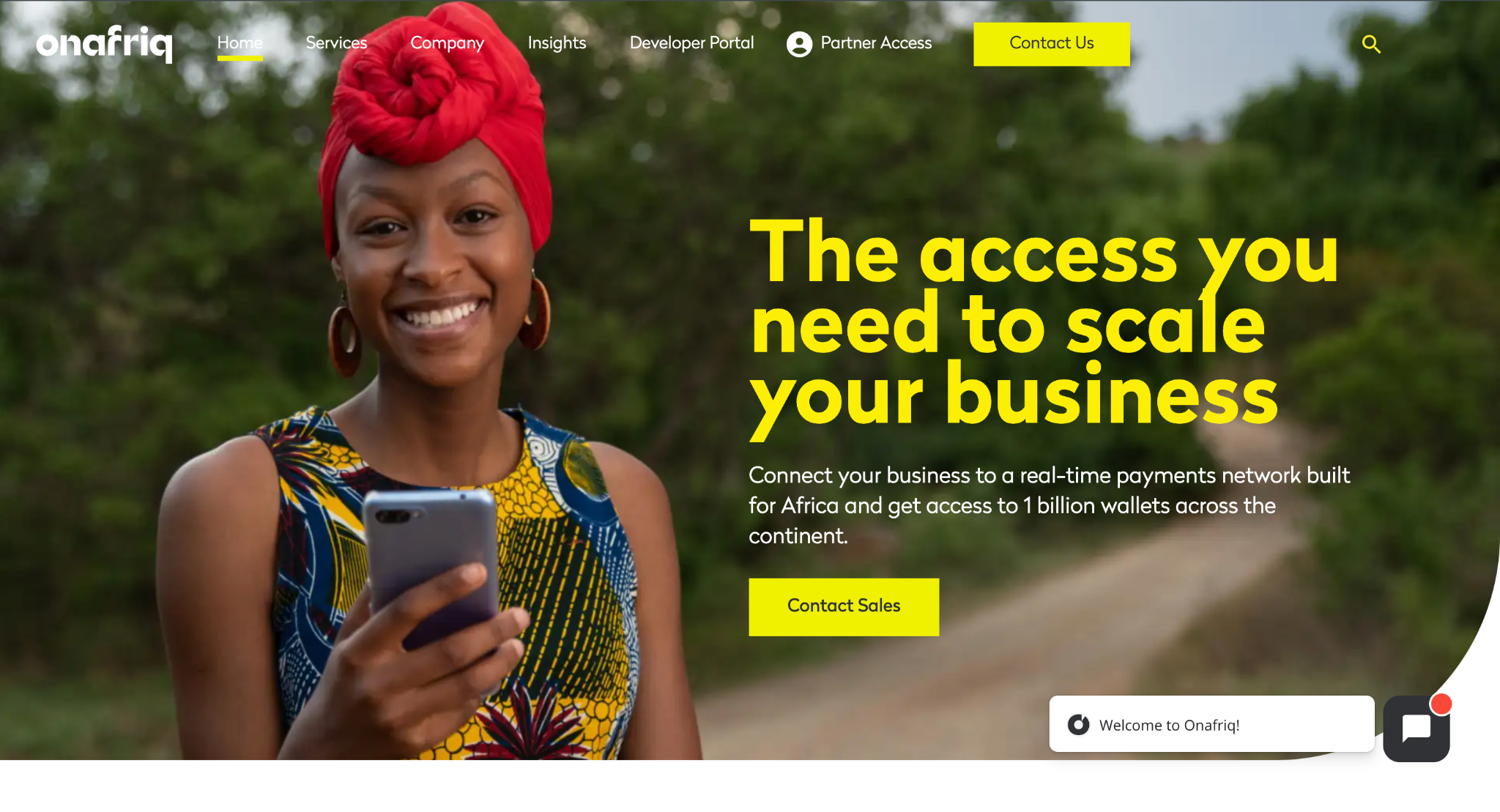
The company built API-based infrastructure to bridge these gaps, evolving from a basic mobile money switch into comprehensive omnichannel payment capabilities. Their technology enables telecom operators to provide international services through unified integration rather than managing dozens of separate partnerships.
Onafriq's growth strategy focused on strategic acquisitions to expand capabilities. Acquiring Beyonic added Uganda-based B2B payment processing for merchant transactions. The Baxi purchase brought Nigeria's extensive agent network of 90,000+ touchpoints, establishing a presence in Africa's largest economy with essential regulatory approvals.
Purchasing Global Technology Partners provided card processing infrastructure, connecting 80+ banks across 34 countries to major card networks, including Visa and Mastercard. This acquisition enabled innovative card-to-wallet functionality, allowing users to fund international subscriptions and e-commerce purchases.
These acquisitions required $100 million in Series C funding but created integrated infrastructure spanning remittances, card services, agent banking, and business payments. The platform now connects nearly 1 billion mobile wallets and 500 million bank accounts, operating multiple specialised APIs that combine acquired technologies into unified payment solutions.
Onafriq demonstrates that acquisition-driven infrastructure development can help improve Africa's payment fragmentation more effectively than building individual solutions from scratch.
Conclusion
These 7 are not the only B2B payment processing companies on the continent. They were picked based on my editorial preferences.
The transformation of Africa's payment landscape over the past fifteen years tells a story of innovation born from necessity. From Interswitch's pioneering work in 2002 to today's API-driven platforms processing trillions in transactions, these seven companies and others have built the financial rails that power Africa's digital economy. Each provider brings unique strengths to the table. Interswitch offers deep institutional relationships and battle-tested infrastructure. Flutterwave excels at global connectivity. Paystack delivers exceptional developer experience. DPO Group provides comprehensive Southern African coverage. Ultimately, your choice depends on what you need.
But for businesses seeking the simplest path to comprehensive African payment infrastructure, Kora stands out. The magic of Kora isn’t just smooth payment APIs that help you scale across Africa. It’s accessing Payments, Identity and other tools you need in one giant suite. Plus Kora offers the best support you can get on the continent; technical and non-technical support. This unified approach means faster time-to-market, reduced complexity, and lower operational overhead. Instead of managing relationships with dozens of providers, businesses can reach Africa’s markets through Kora.







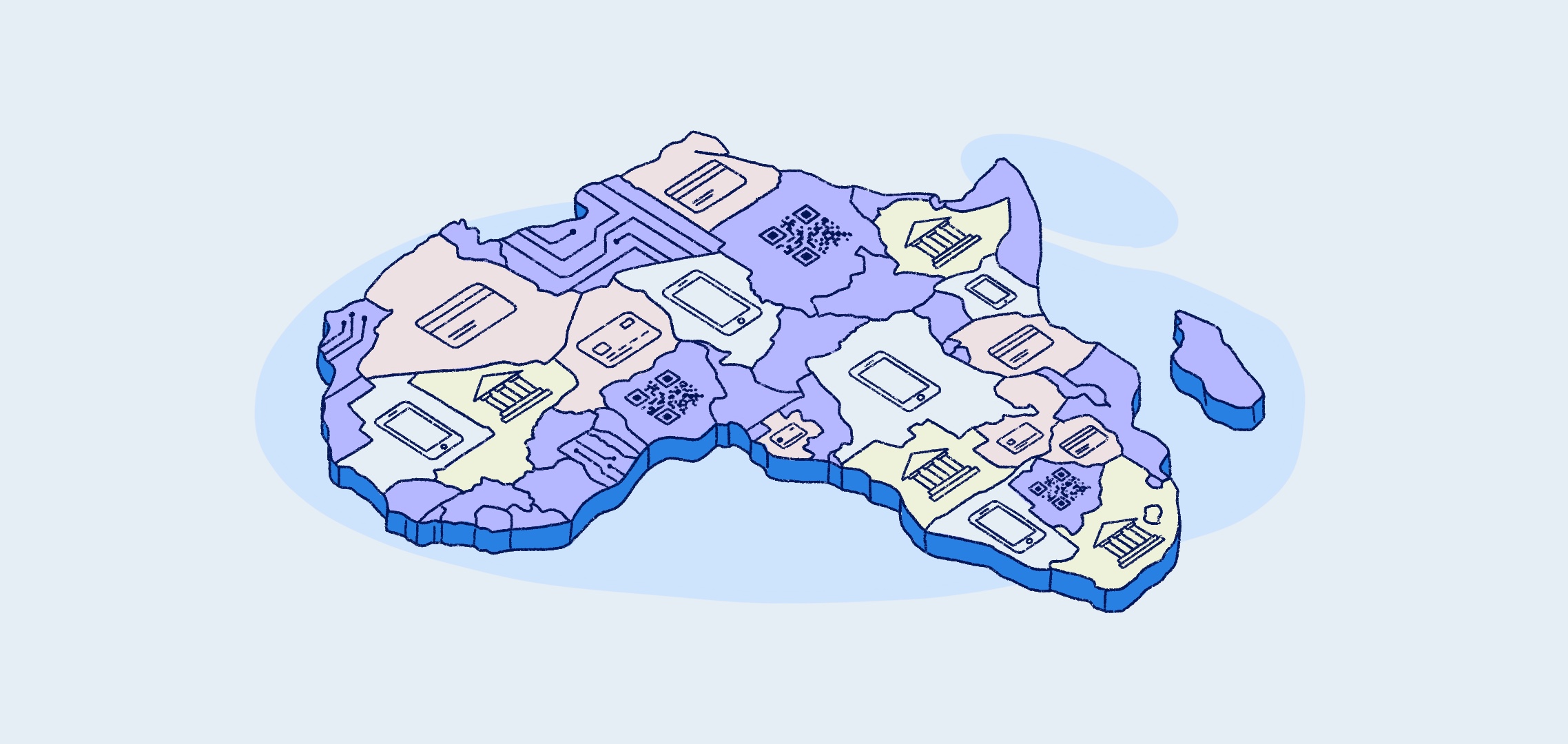
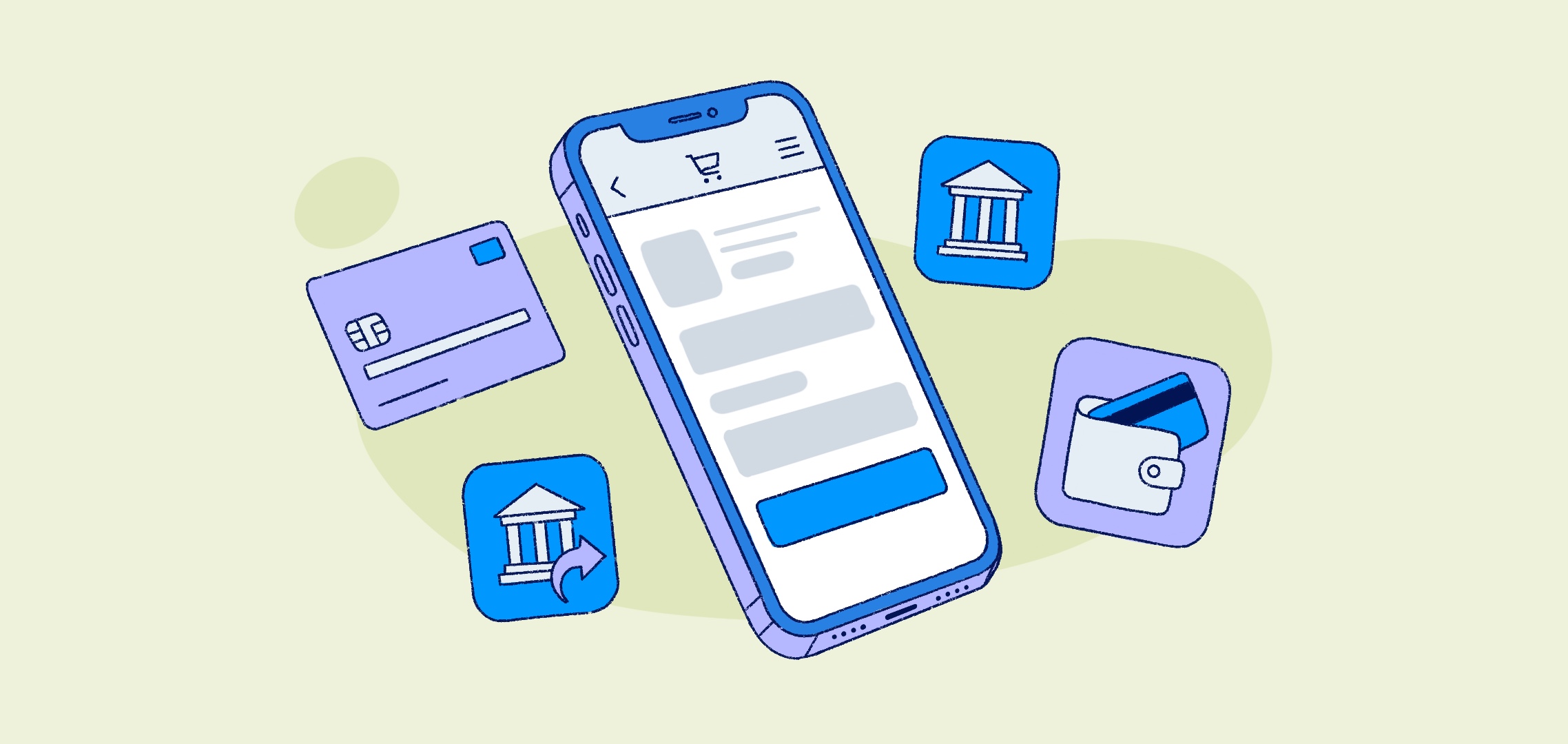

.png)



%201.png)
%201.png)

%201.svg)











%201.png)
%201%20(1).png)